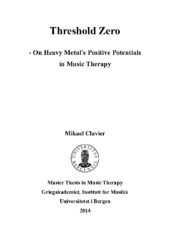| dc.contributor.author | Clavier, Mikael | eng |
| dc.date.accessioned | 2014-08-18T06:59:41Z | |
| dc.date.available | 2014-08-18T06:59:41Z | |
| dc.date.issued | 2014-05-15 | eng |
| dc.date.submitted | 2014-05-15 | eng |
| dc.identifier.uri | https://hdl.handle.net/1956/8287 | |
| dc.description.abstract | This thesis examines the positive potentials of heavy metal music. A comprehensive literature review reveals a lack of research on this field, giving inspiration to a qualitative study that focuses on heavy metal as a positive resource in a music therapeutic context. Data collection is conducted through interviewing three young men who during adolescence experienced heavy metal as important, if not crucial to their mental health. The interviews examine different aspects of this and have a strong focus on the interviewees' own experiences. The interviews are interpreted and analyzed in light of the theory that is selected based on the author's own pre-understandings. It appears that heavy metal may have been more than just an "image" or entertainment. The informants have used heavy metal as a source of deep reflections about themselves and others. The music has served as support in difficult times through empathy and mirroring, and has given them a sense of community with others in similar situations. The discussion deals with how the elements retrieved from the informants' descriptions can be implemented in a music therapeutic context. It proposes four main focus areas for music therapists: interpretation of lyrics, exploration of emotions, exploration of boundaries and channeling of energy. With the therapeutic relationship as a key element among these focus areas, it is argued how heavy metal can be a beneficial value in music therapy. | en_US |
| dc.description.abstract | Denne masteroppgaven tar for seg heavy metals positive postensiale. En omfattende literaturgjennomgang avslører en mangel på forskning på dette, noe som har inspirert til en kvalitativ studie som fokuserer på heavy metal som positiv resurs i en musikkterapeutisk kontekst. Datainnsamling foregår gjennom intervju av tre unge menn på henholdsvis 20, 22 og 26 år, som i løpet av ungdomstiden har opplevd heavy metal som noe viktig, om ikke avgjørende for deres mentale helse. Intervjuene undersøker forskjellige aspekter av dette og har stort fokus på informantenes egne erfaringer. ! Intervjuene blir tolket og analysert i lys av teori som er valgt med utgangspunkt i forfatterens egen forforståelse. Det kommer frem at heavy metal kan ha vært mer enn kun et «image» eller underholdning. Informantene har brukt heavy metal som kilde til dype refleksjoner om dem selv og andre. Musikken har fungert som støtte i vanskelige tider gjennom empati og speiling, og har gitt dem en følelse av fellesskap. ! Det diskuteres videre hvordan elementer hentet fra informantenes beskrivelser kan implementeres i en musikkterapeutisk kontekst. Det foreslås fire fokusokmråder for musikkterapueter: tolkning av tekst, utforskning av emosjoner, utforskning av grenser, og kanalisering av energi. Med den terapeutiske relasjonen som sentralt element blant disse fokusområdene argumenteres det for hvordan heavy metal kan være en gunstig resurs i musikkterapi. | en_US |
| dc.format.extent | 1163443 bytes | eng |
| dc.format.mimetype | application/pdf | eng |
| dc.language.iso | eng | eng |
| dc.publisher | The University of Bergen | eng |
| dc.subject | Music | eng |
| dc.subject | Therapy | eng |
| dc.subject | heavy metal | eng |
| dc.subject | positive | eng |
| dc.subject | Resources | eng |
| dc.title | Threshold Zero - On heavy metal's positive potentials in music therapy | eng |
| dc.type | Master thesis | |
| dc.rights.holder | Copyright the author. All rights reserved | |
| dc.description.degree | Master i Musikkterapi | |
| dc.description.localcode | MAHF-MUTP | |
| dc.description.localcode | MUTP350 | |
| dc.subject.nus | 715999 | eng |
| fs.subjectcode | MUTP350 | |
